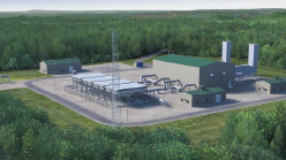Gaslelectric operational coordination is required in order for each industry sector to optimize the value provided in competitive energy markets. The key to improving gaslelectric operational coordination is through improved communications. Improved communications can only occur if participants in the two industries work to understand each other’s operating constraints and information requirements.
In addition, industry participants must overcome an unwillingness to share operational data. Interstate pipelines have been working under Standards of Conduct that guide both the sharing and confidentiality of information between affiliates and non-affiliates. Efforts are currently underway to develop similar guidelines related to the sharing of electric power operational information.
There is also the need for the improved efficiency in processing information requests. Most pipelines currently have their own unique electronic bulletin board (EBB) system. Different EBB systems result in an undue burden on shippers that interact with multiple pipelines. The time and effort required to utilize different EBBS can result in lost opportunities to optimize the natural gas delivery system. The current effort in the gas industry to standardize certain business practices is expected to alleviate this concern.
Aided in part by the work of various regional reliability councils and utility-to-utility operating agreements, the electric power industry has historically enjoyed effective intra-industry operational communication. In some ways, this is similar to the situation that existed in the natural gas industry related to communications among interstate pipelines prior to open access transportation initiatives. As the largely integrated electric power industry restructures, it must avoid the problems associated with multiple quasi-proprietary communication and information exchange systems.
As natural gas has increased in importance as a fuel for power generation, a number of regional and national efforts have been initiated to improve communications between the natural gas and electric industries. In addition, there are notable success stories – Southwestern Public Service Company and Florida Gas Transmission/Florida Power & Light – that can provide valuable "lessons learned".
- In the situations where natural gas has been deemed to be important to an electricutility, the electric utility has sought to build effective working relationships with keyplayers in the natural gas industry to ensure that operational coordination will occur. All electric utilities need to recognize that gas is, and in the future will be, an important power plant fbel for their generation systems and need to develop both an in-depth understanding of gas industry (especially pipeline) operational issues and strong working relationships within the natural gas industry.
- In those situations where electric utilities represent significant load, that is, are important customers for natural gas, gas industry players ofien view electric utilities as "key accounts" and take steps to understand their customers’ specific fbel use and operational needs. The same statement can be made in connection with gas-fired generation operated by independent power producers. All gas industry players, but especially pipelines, need to recognize the importance of electric power load, to establish "key account" relationships with electric generators, and to develop an indepth understanding of their customers’ operational requirements.
- Ongoing regulatory reform continues to lead to increased competition in energy markets. This increased competition continues to serve as an important agent of change leading to the restructuring of both the natural gas and electric power industries. A changing business environment combined with advances in information and telecommunications technologies are challenging assumptions of heretofore meaningful industry boundaries: When a large percentage of gas companies are pursuing cogeneration, independent power production, power marketing and/or energy services, what defines the natural gas industry? When increasing numbers of electric utilities are considering energy-gas and power-marketing strategies, pursuing fbel neutral energy services initiatives, andlor developing gas management capabilities in connection with major commitments to new gas-fired generation, what defines the electric power industry?
- Clearly industry definitions and distinctions are blurring. Accordingly, issues related to gaslelectric operational coordination and information exchange are less and less interindustry issues and should be viewed as intra-industry concerns, in this case, referring to the energy industry.
- Gaslelectric participants need to recognize that whereas inter-industry communications problems may be valid (for a time anyhow), from a market perspective, intra-industry problems are not. When you pull up to a gas station, all customers expect that there will be gas available in the underground tanks, that the pumps will work, and that if they want extras like a car wash they’ll be able to get it.
- Gaslelectric participants need to adopt a market perspective or, as competitive pressures increase, expect to be replaced by players that will.
-
The changing regulatory environment will undoubtedly present challenges. However, information and telecommunications technologies are there to help and the rewards are certain to follow for those entities that make the effort to improve gaslelectric operational coordination and information exchange.





